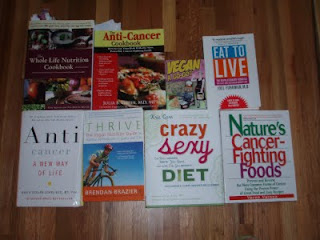Over the past few months, I have accumulated quite the library to help me do just that. Up until now, Shannon has taken primary responsibility with cooking healthful meals for us. Since I'm done with chemo and have a few weeks off work, I have decided to take over the cooking duties and become (more) proficient at our new style of eating.
Some of our anti-cancer cooking resources
Even though I have 'no evidence of disease,' I will never know for sure if I have been 'cured' of cancer. The one thing I do have control over is how I take care of my body. Basically, we are focusing primarily on a plant-based diet. Even the Nutritionist I consulted with at Huntsman recommended a plant-based diet. This is not to say that I can not/do not eat any animal products. I'm still eating quite a bit of greek yogurt and I do occasionally sprinkle some low fat cheese on my food, however the literature (I have read) strongly supports limited animal product as part of the anti-cancer diet. In support of our new diet, Joel Fuhrman, M.D. writes in Eat to Live that countries that get the greatest percentage of their diet from unrefined plant foods have the lowest percentage of deaths from heart disease and cancer and David Servan-Schreiber, MD, PhD recommends that "the anticancer diet is made up primarily of vegetables and legumes prepared with olive, canola, or flaxseed oil, or omega-3 butter, herbs, and spices. Unlike the traditional Western diet, meat and eggs are much less prominent; they are served as accompaniments in small amounts".
The second staple to the anticancer diet is reducing sugar/white flour - foods with a high glycemic index. It is common knowledge that when sugar is consumed blood glucose levels rise rapidly and insulin is released. Insulin release is accompanied by IGF (insulinlike growth factor) whose role is to stimulate cell growth. Basically, according to Servan-Schreiber, sugar (indirectly) nourishes tissues and makes them grow faster and essentially serves as fertilizer for tumors. Pretty good reason to reduce sugar intake!
I definitely still have room for improvement at implementing this diet, but it does seem to be getting easier especially as I become more proficient at preparing meals.
How does this fit in an endurance athlete's diet? I'm not quite sure yet, but there are successful elite level athletes who are vegan so I'm confident that a modified vegan diet is possible.
Here are some yummy meals I cooked up this week. I'm not very good at following recipes, so usually I start with an idea from one of my cookbooks and then wing it.
I can't remember exactly what I put in this, but it looks like pinto beans (cooked in a slow cooker) topped with sauteed kale, corn, mushroom, red onion, olive oil and garlic.
Black bean, yam, spinach, onion, garlic, and sprinkled mozzarella cheese on a whole wheat pita. This meal had 26 grams of protein!
2 egg whites (see I do eat some animal product) topped with sauteed kale, mushroom, red pepper, and green onion makes for a yummy breakfast.
The very best breast cancer fighting foods (According to Servan-Schreiber in Anti Cancer): kale, broccoli, cabbage, cauliflower, brussel sprouts, scallions, leeks, and garlic. Our fridge is usually loaded with this stuff, although I need a good cauliflower recipe.
And of course, the requisite Dizzy photos:
Dizzy likes to watch me do yoga and I guess he thought he would try out my mat. He is now almost one year old and is earning more house privileges although he did chew up Shannon's flip flops this week:)
**I suppose I should have a disclosure that this anti cancer diet is what I feel is right for me at this moment. I am in no way suggesting that I have any idea what the best diet is to prevent cancer**










